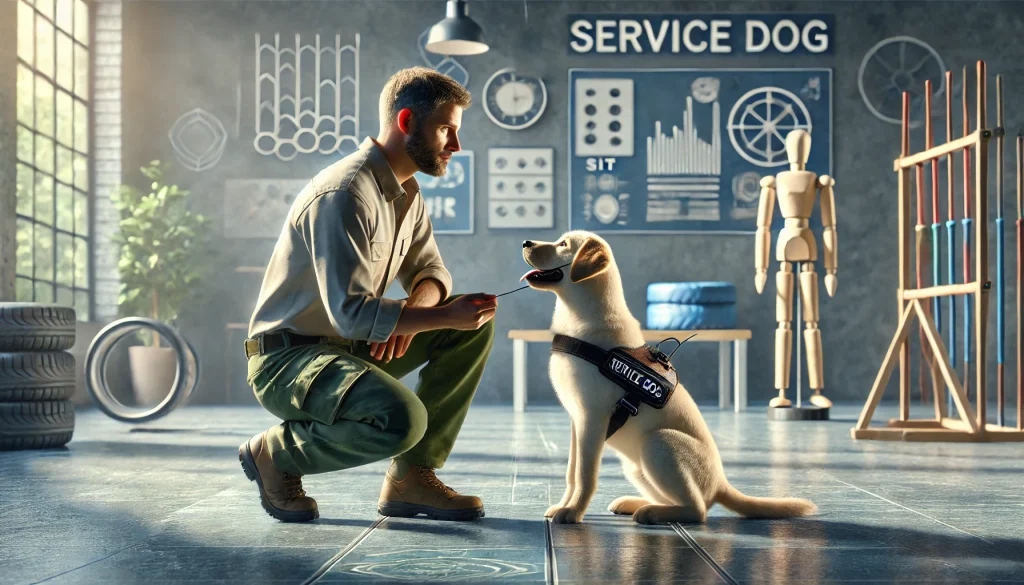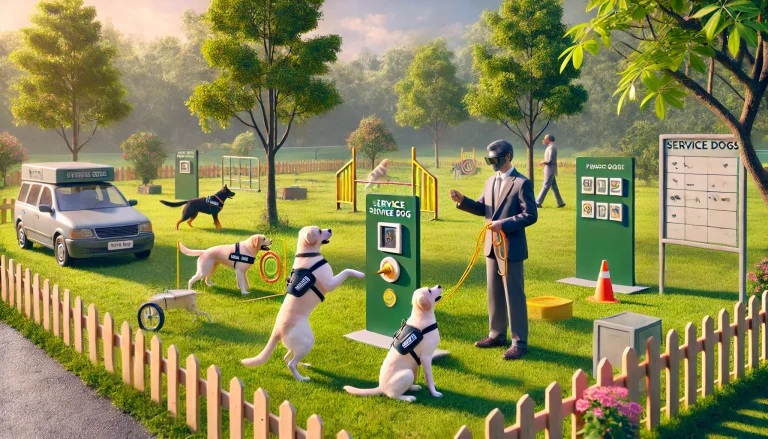Introduction
Selecting the right service dog is a crucial decision that can significantly impact the quality of life for individuals with disabilities. This blog will guide you through the essential factors to consider, such as service dog breeds, service dog temperament, and training requirements for service dogs. By understanding these factors, you can make an informed choice that best suits your needs.

Understanding Service Dog Breeds
Common Breeds for Service Dogs
Different breeds excel in different service roles. Popular service dog breeds include Labrador Retrievers, Golden Retrievers, and German Shepherds. These breeds are known for their intelligence, trainability, and friendly nature.
- Labrador Retrievers: Known for their gentle disposition and high intelligence, Labs are excellent for various service roles, including guide dogs and mobility assistance dogs.
- Golden Retrievers: Similar to Labs, Goldens are friendly, intelligent, and easy to train. They are often used for emotional support and therapy.
- German Shepherds: These dogs are highly trainable and have a strong work ethic. They are often used in roles that require alertness and quick response, such as police and military service.
Considering Other Breeds
While the above breeds are common, other breeds can also make excellent service dogs. Poodles, Border Collies, and Bernese Mountain Dogs are examples of other breeds that can be trained for service work. The key is to match the breed’s characteristics with the specific needs of the handler.
Evaluating Service Dog Temperament
Importance of Temperament
A service dog’s temperament is crucial for its success in service roles. A good service dog should be calm, confident, and adaptable. They should not be easily startled and must be able to focus on their tasks even in distracting environments.
Assessing Temperament in Puppies
When selecting a puppy for service work, it’s essential to assess its temperament. Look for puppies that are curious but not overly aggressive or fearful. They should be able to handle new situations with confidence and show an eagerness to learn.
- Calmness: A good service dog remains calm under pressure and does not react aggressively to unexpected stimuli.
- Confidence: The dog should be confident and not easily frightened by new experiences or environments.
- Sociability: The dog should be friendly and comfortable around people and other animals.

Training Requirements for Service Dogs
Basic Obedience Training
Before a dog can begin specialized service training, it must master basic obedience. Commands such as sit, stay, come, and heel are fundamental. Basic obedience ensures that the dog can follow instructions and behave appropriately in various situations.
Specialized Training
Once basic obedience is mastered, the dog can move on to specialized training. This training is tailored to the specific needs of the handler and the tasks the dog will perform. For example, a guide dog will be trained to navigate obstacles, while a diabetic alert dog will be trained to detect changes in blood sugar levels.
- Task-Specific Training: Depending on the handler’s needs, the dog will learn tasks such as retrieving items, opening doors, or alerting to medical conditions.
- Public Access Training: Service dogs must be trained to behave appropriately in public places, such as restaurants, stores, and public transportation.
Importance of Consistency and Patience
Training a service dog requires consistency, patience, and positive reinforcement. The training process can take several months to years, depending on the tasks and the dog’s learning pace. Regular practice and reinforcement are crucial to maintaining the dog’s skills.

The Role of Health and Genetics
Genetic Health Considerations
When choosing a service dog, it’s important to consider the dog’s genetic health. Some breeds are prone to specific health issues that can affect their ability to perform service tasks. Ensuring the dog comes from a reputable breeder who screens for genetic conditions can help mitigate these risks.
Regular Health Check-Ups
Maintaining the health of a service dog is vital for its longevity and effectiveness. Regular veterinary check-ups, a balanced diet, and proper exercise are essential. Investing in pet insurance can help cover the costs of routine and emergency medical care.
The Importance of Pet Insurance and Service Dog Products
Pet Insurance
Investing in pet insurance is crucial for service dog owners. Pet insurance can help cover the cost of routine veterinary care, emergency treatments, and specialized medical procedures. This ensures that your service dog remains healthy and able to perform their tasks effectively.
Service Dog Products
Using the right service dog products can enhance your dog’s comfort and effectiveness. Consider items such as service dog vests, leashes, harnesses, and training tools. These products not only make it clear that your dog is a working animal but also ensure they can perform their tasks efficiently.
Self-Training Options
Resources for Self-Training
For those interested in self-training their service dog, resources are available through ServiceDogOwners.com. This includes training guides, instructional videos, and support forums. Self-training can be a cost-effective and personalized approach to preparing your service dog for its role.
Real Stories of Choosing the Right Service Dog
Maria’s Experience
Maria, who has mobility issues, shares her story of selecting her service dog, Rex. “I chose a Labrador Retriever because of their reputation for being reliable and easy to train. Rex has been a lifesaver, helping me with daily tasks and providing emotional support.”
John’s Journey
John, a veteran with PTSD, talks about his experience with his service dog, Max. “I needed a dog that could help me manage my anxiety and provide comfort. Max, a Golden Retriever, has been perfect. His calm demeanor and training have made a huge difference in my life.”
The Future of Service Dogs
As our understanding of service dog training and care evolves, new techniques and technologies will enhance the effectiveness of these incredible animals. Continued research into service dog breeds, temperament, and training methods will ensure that service dogs can provide even more support to those in need.
Conclusion
Choosing the right service dog involves careful consideration of various factors, including service dog breeds, temperament, and training requirements. By understanding these factors and investing in the right resources, you can select a service dog that will provide invaluable support and improve your quality of life.
At ServicePupSolutions.com, we are dedicated to helping you find the perfect service dog for your needs. Whether you choose professional training or self-training options through ServiceDogOwners.com, ensuring your service dog is well-prepared and cared for is essential.
Searching for a way to boost your income while keeping your service dog by your side? Learn how to launch a Side Hustle or new career and increase your earnings alongside your loyal companion. Click Here to find out more and start your journey today!






